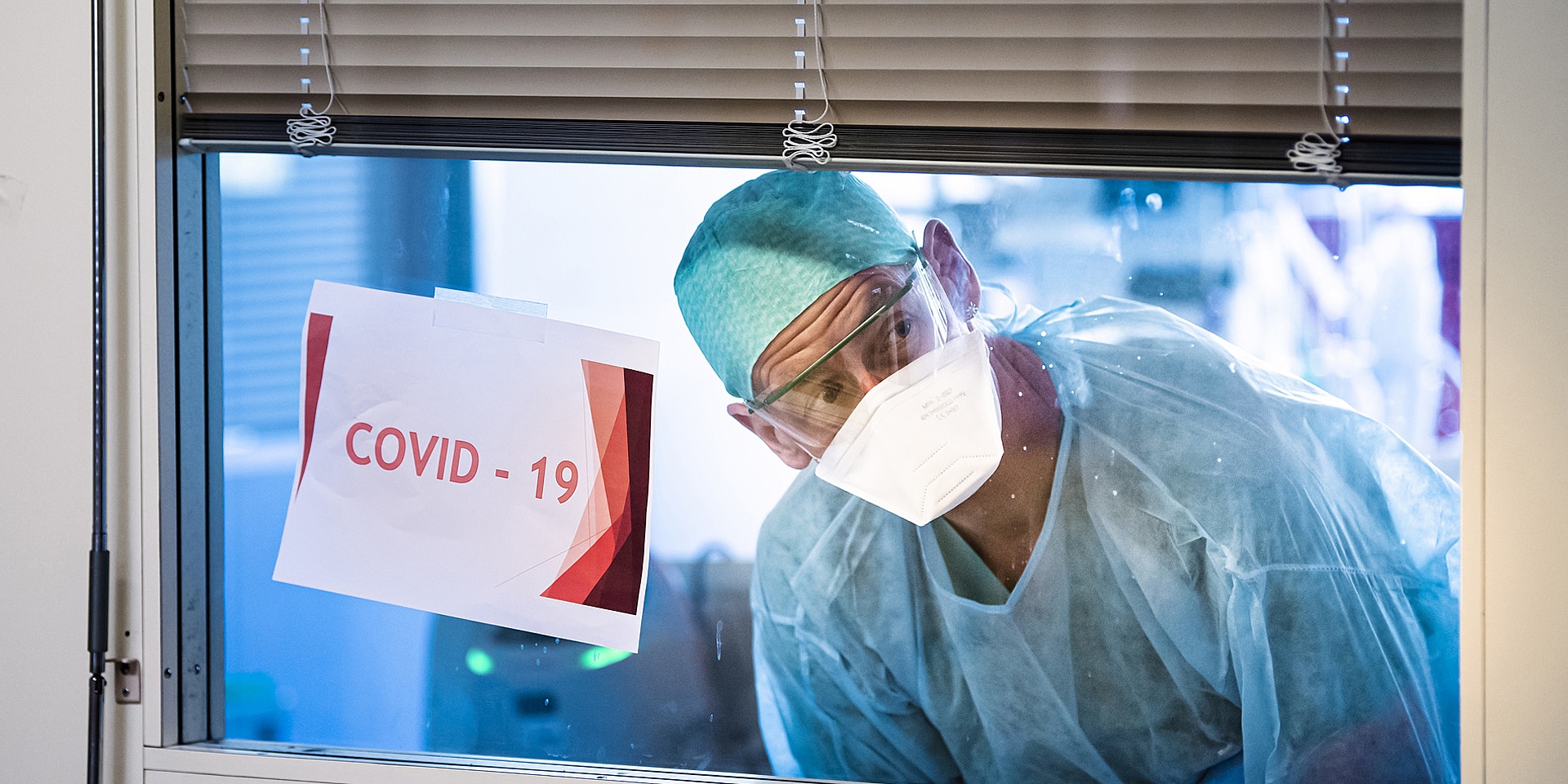What we have learned in the fight against malaria: lessons for COVID–19
The fight against malaria is an important global healthcare priority for Switzerland's international cooperation. Support to build adequate healthcare systems and a concerted response in solidarity with others have proven successful. For Olivier Praz of the Swiss Agency for Development and Cooperation (SDC), the lessons learned in fighting malaria can provide important inputs for COVID–19.

A health worker in the intensive care unit of a hospital in Switzerland during the COVID–19 pandemic. © Keystone
COVID-19: 178,845 deaths (as at 22 April 2020). Malaria: 405,000 deaths in 2019. While the two diseases have different epidemiological characteristics, both are infectious and potentially fatal. There is no vaccine for either disease. Malaria, however, is in decline. Malaria rates worldwide have fallen drastically in the last 20 years.

Olivier Praz heads the malaria desk under the Global Programme Health at the Swiss Agency for Development and Cooperation (SDC). He believes there are lessons to be learned from global efforts to fight malaria.
Interview
It is World Malaria Day and we are in the grip of a global public health crisis caused by the COVID-19 pandemic. Why do you think it is useful to draw parallels between the two diseases?
Malaria and COVID-19 both place a heavy burden on health systems. The crisis is exacerbated and fatalities increase when systems are ill-prepared to cope with a sudden influx of patients.
Our health systems were caught out by the rapid, unpredictable spread of COVID-19. In malaria-endemic countries, there is an explosion in new infections once or twice a year following the wet season, which is when the mosquitoes breed.
Strong healthcare systems with the capacity to respond to sudden epidemics are essential. A health centre that lacks beds, adequately trained staff and well-functioning clinical protocols cannot provide good care.
Structural weaknesses of health systems and a lack of effective prevention are key reasons for high mortality rates linked to the two diseases COVID-19 and malaria.
What do we mean by healthcare system?
In 2000, the World Health Organization (WHO) proposed a definition recognised by all member states (six core components of all health systems):
- adequate infrastructure (health centres, specialised hospitals)
- well-trained and motivated health workers
- reliable supply and access to medical products
- well-functioning information systems (monitoring, research, epidemiological analysis)
- patient-responsive governance
- sustainable financing
Can you give some figures that illustrate the success of the global fight against malaria?
The fight against malaria is one of humanity's great achievements.
According to the WHO, malaria mortality rates fell by 60% in 20 years. The number of deaths fell from 840,000 in 2000 to 440,000 in 2015. New antimalarial drugs developed over the past two decades have saved 2.2 million lives. National campaigns to distribute mosquito nets have had a major impact in terms of prevention.
Switzerland is very active in the fight against malaria, and its expertise is well-recognised. What are the main strengths of Switzerland's activities?
Switzerland is a key international player in the fight against malaria. Its strength lies in its expertise and the effectiveness of its concerted and well-structured engagement.
Switzerland is a founding member of the WHO and the Global Fund, both based in Geneva. It is committed to stepping up the fight against this disease. Many international committees and working groups include Swiss experts. Geneva is the world hub for global health. It hosts a cluster of the world's largest public and private stakeholders, UN agencies, NGOs, research institutes and product development partnerships.
The Federal Department of Foreign Affairs has endowed its international cooperation with a comprehensive global health programme, which has focused special attention on the fight against malaria for decades. Switzerland relies on relevant, high-impact partnerships. For example, the FDFA works with the Swiss Malaria Group, which brings together public and private sector partners committed to a joint, integrated, sustainable approach.
What have we learned from malaria that we can use in the fight against COVID-19?
Effective public-private partnerships, a combination of measures (prevention, treatment, health and hygiene campaigns) and sustained investment in research and development have proven successful against malaria.
Concerted, highly organised efforts have been made year after year to achieve the third Sustainable Development Goal of the 2030 Agenda for Sustainable Development (2015), which seeks to end the malaria epidemic by 2030. Wide-scale partnerships have developed between malaria-endemic countries, research institutes, international organisations and funds, the private sector and international donors.
Affected countries receive financial assistance and technical support, both to buy diagnostic equipment and therapies and to strengthen their health systems.
Interventions on the ground have combined different approaches involving prevention, provision of treatments virtually free of charge and health promotion. To defeat a pandemic, it isn't enough to develop and distribute treatments. You have to explain in order to change people's behaviour and promote hygiene and responsible practices.
To a large extent, all these lessons learned can be replicated to help us to fight COVID-19 effectively.
Does the SDC plan to include COVID-19 in its Global Programme Health?
Weak or overburdened health systems and inadequate access to care and medicines have exacerbated the threat posed by COVID-19, including in many countries in the Global South and in the developing world.
For example, Switzerland has 4.4 doctors per 1,000 inhabitants, whereas Burkina Faso has 0.44, Congo 0.28, Bolivia 1.6, and India 0.8 doctors per 1,000 inhabitants.
The SDC's response to COVID-19 seeks to strengthen health systems to ensure timely, suitable care for those who need it. International cooperation must have the capacity to adapt to shocks like pandemics and to the specific contexts of countries in the Global South.
The SDC's Global Programme Health is currently developing proposals along these lines. This will include global research and development initiatives for medical products, ensuring that health systems are better prepared for pandemics, and adapting many ongoing programmes, including for example mental health and the health determinants affected by COVID-19.
The SDC is currently involved in international negotiations for a global, coordinated response in low and middle-income countries. It is essential that the international community, including Switzerland, respond effectively and show solidarity both in the current fight against COVID-19 and in the fight against malaria.
Defeating this pandemic will require us to pay special attention to the countries of the South and adopt measures tailored to those countries (e.g. that reflect how people deal with information on health and diseases, the state of health systems and access to diagnosis, healthcare and medicines), and to the most vulnerable. The COVID-19 pandemic must not undermine other commitments to stamp out other lethal diseases and promote sustainable healthcare for all.
Links
- Health – A prerequisite for development
- Malaria, World Health Organization
- World Health Organization: Tailoring malaria interventions in the COVID-19 response
- Global Fund to Fight AIDS, Tuberculosis and Malaria
- Swiss Malaria Group
- Medicines for Malaria Venture (MMV)
- Réseau santé de la DDC, Analyses thématiques – Covid-19
- SDC Health Network, Contributions Spring 2020
